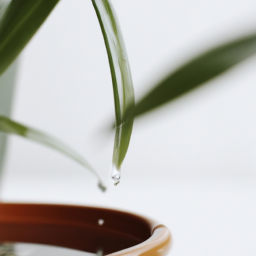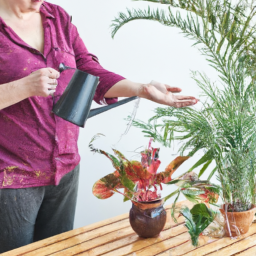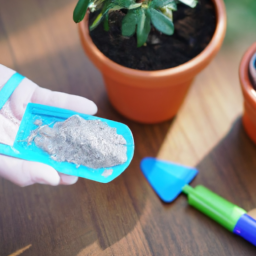
Are you struggling to keep your houseplants thriving? One often overlooked factor that can greatly impact the health of your indoor greenery is the type of water you use. In this blog post, we will discuss the importance of using the best water for houseplants and how it can make a significant difference in the growth and overall well-being of your plants. Whether you’re a seasoned plant parent or just starting out with your indoor garden, understanding the role of water quality is key to helping your plants flourish. Let’s dive in and explore how you can provide the optimal hydration for your beloved houseplants.
Benefits of Using Distilled Water for Houseplants
Welcome to our guide on the best water for houseplants! In this article, we will explore the benefits of using distilled water for your indoor plants. Houseplants require proper care and attention, including the type of water you use to water them. Distilled water is a popular choice among plant enthusiasts for several reasons. Let’s delve into why distilled water can be beneficial for your houseplants.
Removes Harmful Minerals
One of the main benefits of using distilled water for houseplants is that it is free from harmful minerals. Tap water often contains chlorine, fluoride, and other chemicals that can be detrimental to the health of your plants. These minerals can build up in the soil over time, leading to nutrient deficiencies and poor growth. By using distilled water, you can ensure that your plants are not exposed to these harmful substances.
In addition, tap water may also contain salts and other impurities that can accumulate in the soil and cause root burn. Distilled water, on the other hand, is pure and free from any contaminants, making it a safer choice for your houseplants. By using distilled water, you can help prevent mineral buildup in the soil and promote healthier growth for your plants.
Furthermore, using distilled water can also help prevent the growth of algae and other harmful microorganisms in the soil. Tap water can introduce these organisms into the soil, leading to issues such as root rot and fungal infections. By using distilled water, you can minimize the risk of these problems and create a healthier environment for your houseplants to thrive.
Prevents Leaf Burn
Another benefit of using distilled water for houseplants is that it can help prevent leaf burn. Tap water often contains high levels of salts and minerals that can accumulate on the leaves of your plants. This buildup can block the pores of the leaves, preventing them from absorbing sunlight and nutrients effectively. Over time, this can lead to yellowing, browning, or even burning of the leaves.
Distilled water, being free from salts and minerals, can help prevent this issue and keep your plant’s leaves healthy and vibrant. By using distilled water, you can ensure that your plants are able to photosynthesize properly and maintain their overall health and appearance. This can result in lusher foliage, more vibrant blooms, and overall better growth for your houseplants.
Additionally, using distilled water can also help prevent the accumulation of mineral deposits on the leaves, which can attract pests such as spider mites and aphids. These pests can damage your plants and spread diseases, leading to further issues down the line. By using distilled water, you can reduce the risk of pest infestations and create a healthier environment for your houseplants.
Improves Nutrient Absorption
One more benefit of using distilled water for houseplants is that it can improve nutrient absorption. Tap water with high mineral content can interfere with the uptake of essential nutrients by your plants. These minerals can bind to nutrients in the soil, making them less available to the roots of your plants. This can result in nutrient deficiencies and poor growth.
Distilled water, being pure and free from minerals, can help ensure that nutrients in the soil are readily available to your plants. This can enhance the overall health and growth of your houseplants, allowing them to thrive and flourish. By using distilled water, you can optimize nutrient absorption and provide your plants with the essential elements they need to thrive.
In conclusion, using distilled water for your houseplants can offer a range of benefits, including removing harmful minerals, preventing leaf burn, and improving nutrient absorption. By making the switch to distilled water, you can create a healthier environment for your plants to grow and thrive. Remember to water your houseplants consistently and monitor their growth to ensure they are receiving the care they need. Happy gardening!

Comparing Tap Water vs. Filtered Water for Houseplants
As an expert in houseplant care, I often get asked about the best type of water to use for watering indoor plants. The debate between tap water and filtered water is a common one among plant enthusiasts, with each option having its own set of pros and cons. In this article, we will compare tap water and filtered water to help you make an informed decision on what is best for your houseplants.
TAP WATER
Tap water is the most convenient and readily available option for watering houseplants. It is usually treated with chemicals such as chlorine and fluoride to make it safe for human consumption. While these chemicals are generally harmless to humans, they can have a negative impact on the health of your plants.
Chlorine, for example, can build up in the soil over time and hinder the absorption of nutrients by the plant roots. This can lead to stunted growth and yellowing leaves. Fluoride, on the other hand, can cause leaf burn and tip dieback in sensitive plants. Additionally, tap water often contains minerals such as calcium and magnesium, which can accumulate in the soil and cause salt buildup.
To mitigate the negative effects of tap water on your houseplants, you can let the water sit out for 24 hours before using it. This will allow the chlorine to evaporate and the water to reach room temperature, which is ideal for plant uptake. You can also consider using a water filter or a dechlorinator to remove harmful chemicals from the water.
FILTERED WATER
Filtered water, on the other hand, is free from harmful chemicals and contaminants that can harm your houseplants. It has been purified through a filtration system, which removes impurities such as chlorine, fluoride, and heavy metals. This makes filtered water a safer and healthier option for watering indoor plants.
Plants that are sensitive to chemicals in tap water, such as orchids and ferns, will benefit from being watered with filtered water. Filtered water also helps prevent salt buildup in the soil, as it does not contain minerals that can accumulate over time. This can improve the overall health and longevity of your houseplants.
While filtered water is a better option for houseplants, it may not always be practical or cost-effective for everyone. Investing in a water filtration system can be expensive, and not everyone has access to filtered water. In such cases, using tap water that has been allowed to sit out or treated with a dechlorinator is a good alternative.
CONCLUSION
When it comes to choosing the best water for your houseplants, filtered water is the superior option. It is free from harmful chemicals and contaminants that can negatively impact plant health. However, tap water can still be used effectively if it is allowed to sit out or treated with a dechlorinator.
Ultimately, the choice between tap water and filtered water will depend on your budget, access to filtered water, and the sensitivity of your houseplants. Whichever option you choose, be sure to water your plants consistently and monitor their health to ensure they are receiving the proper care they need to thrive.

Tips for Choosing the Best Watering Schedule for Houseplants
Houseplants require regular watering to thrive, but not all water is created equal. In order to ensure the health and vitality of your indoor plants, it’s important to consider the type of water you use. Here are some tips for choosing the best water for your houseplants:
1. Tap Water vs. Filtered Water
When it comes to watering your houseplants, you may be wondering whether tap water or filtered water is the better option. Tap water typically contains minerals and chemicals that can be harmful to plants over time. These chemicals can build up in the soil and inhibit the plant’s ability to absorb nutrients. Filtered water, on the other hand, is free from these harmful substances and is a better choice for your houseplants.
However, if you don’t have access to filtered water, you can still use tap water for your plants. Just be sure to let the water sit out for at least 24 hours before watering your plants. This will allow the chlorine and other chemicals to evaporate, making the water safer for your plants.
Another option is to collect rainwater for your houseplants. Rainwater is naturally free from chemicals and minerals, making it an excellent choice for watering indoor plants.
2. Temperature of Water
The temperature of the water you use to water your houseplants can also have an impact on their health. Cold water can shock the roots of your plants, while hot water can scald them. It’s best to use room temperature water for your houseplants, as this will be the most gentle on their roots.
If you live in a cold climate and your tap water is too cold, you can let it sit out for a few hours to reach room temperature before using it on your plants. Similarly, if you live in a hot climate and your tap water is too warm, you can let it cool down before watering your plants.
Consistency is key when it comes to watering your houseplants, so be sure to use water that is at a consistent temperature each time you water your plants.
3. Frequency of Watering
Knowing how often to water your houseplants can be tricky, as different plants have different watering needs. In general, most houseplants prefer to dry out slightly between waterings, rather than being constantly moist. Overwatering can lead to root rot and other issues, so it’s important to let the soil dry out a bit between waterings.
One way to determine if your plants need water is to stick your finger into the soil. If the top inch or so is dry, it’s time to water your plants. You can also use a moisture meter to determine the moisture level of the soil.
It’s important to water your plants thoroughly when you do water them, ensuring that the water reaches the roots. Allow any excess water to drain out of the bottom of the pot, as stagnant water can lead to root rot.
By following these tips for choosing the best water for your houseplants, you can help ensure that your indoor plants thrive and grow beautifully. Remember to pay attention to the type of water you use, the temperature of the water, and the frequency of watering to keep your plants happy and healthy.
Here’s the Summary Snapshot
Choosing the right water for your houseplants may seem like a small detail, but it can actually make a big difference in the health and growth of your plants. Tap water, while convenient, may contain chemicals like chlorine and fluoride that can be harmful to your plants over time. To avoid this, consider using filtered or distilled water instead. These options remove impurities and provide a cleaner source of water for your plants to thrive.
Another important factor to consider when watering your houseplants is the temperature of the water. Cold water can shock the roots of your plants, while hot water can scald them. It’s best to use room temperature water to ensure that your plants receive the hydration they need without any negative effects. By paying attention to the type and temperature of the water you use, you can help your houseplants stay healthy and vibrant for years to come.
Check Out These FAQs:
Q1: What is the best type of water to use for houseplants?
A1: The best type of water to use for houseplants is distilled or filtered water. These types of water are free from harmful chemicals and minerals that can build up in the soil and harm your plants over time.
Q2: Can I use tap water for my houseplants?
A2: While tap water is safe for most houseplants, it can contain chemicals like chlorine and fluoride that may harm sensitive plants. If you choose to use tap water, it’s best to let it sit out for 24 hours to allow any chemicals to evaporate before watering your plants.
Q3: Is rainwater good for houseplants?
A3: Rainwater is an excellent choice for watering houseplants as it is free from chemicals and minerals. However, be cautious of collecting rainwater in urban areas as it may contain pollutants from the air.
Q4: Should I use cold or warm water for my houseplants?
A4: Room temperature water is ideal for houseplants as extreme temperatures can shock the roots. Avoid using water that is too cold or too hot, and instead opt for water that is around the same temperature as the room.
Q5: How often should I water my houseplants?
A5: The frequency of watering your houseplants depends on the type of plant, the size of the pot, and the environmental conditions. In general, it’s best to water when the top inch of soil feels dry to the touch. Be sure to adjust your watering schedule based on the specific needs of your plants.

James Wong is a renowned ethnobotanist, plant scientist, and local television presenter. With a passion for demystifying plant science, he is known for translating complex botanical concepts into practical advice for everyday plant enthusiasts. James’s expertise spans from traditional gardening to cutting-edge plant technologies, making his insights accessible and informative.


